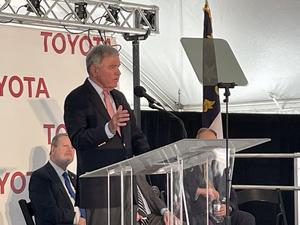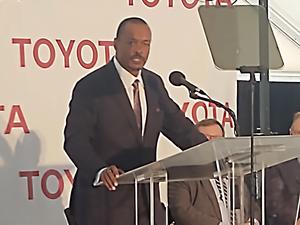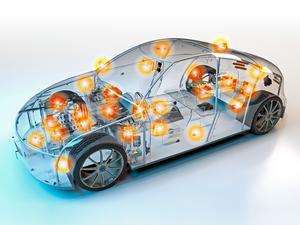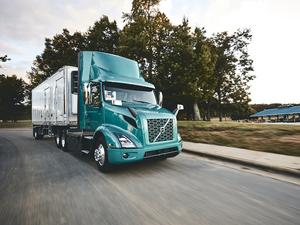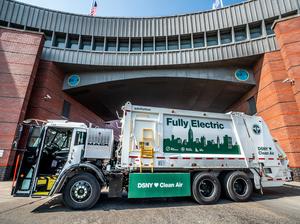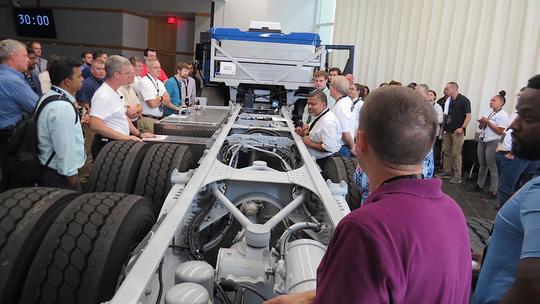
Last week’s announcement that Toyota Motor Co. would bring a $1.29 billion automobile battery manufacturing plant to the Greensboro-Randolph Megasite stole the headlines, but another Triad-based vehicle maker is going all-in on electric conveyance.
Together, they are helping to place the Triad on the leading edge of “transportech.”
Volvo Group North America, which has been working toward development of battery electric Class 8 and heavy-duty trucks under both the Volvo and Mack Trucks brands, lask week hosted key partners for the future of clean transportation.
Michael Regan, administrator for the United States Environmental Protection Agency (EPA) and Ray Curry, president of the United Auto Workers Union (UAW) at its headquarters in Greensboro, came to Volvo North America's headquarters in Greensboro to discuss the company’s efforts toward sustainable transportation and take a few spins around the test track behind the wheel of the Volvo VNR Electric regional hauler and the Mack LR Electric refuse truck.
“It was an honor to host Michael Regan and Ray Curry on our campus, and to discuss with Volvo Group executives the company’s work toward achieving net-zero greenhouse gas emissions by 2040,” said Martin Weissburg, chairman of Volvo Group North America and president of Mack Trucks. “We appreciated the opportunity to show them the fully electric vehicles we’re building today in our U.S. factories, and give them some insights into our plans for continued leadership in the transformation to a more sustainable transportation industry.”
That leadership has resulted in the successful field tests of the Volvo VNR in California via collaboration with the state in the Volvo LIGHTS program. The company began taking orders in early 2021 as commercial production began and partnering with customers to develop the charging infrastructure necessary for practical use. Equipped with a 264-kWh battery capacity, the VNR Electric has an operating range up to 150 miles based on the vehicle’s configuration.
The VNR Electric is targeted for customers with fleets for local and regional hauling applications. Equipped with a driveline rated at 455 horsepower, generating up to 4,051 pound-feet of torque, the Volvo VNR Electric is manufactured at Volvo’s New River Valley assembly facility in Dublin, Virginia.
The Mack LR has been field tested in both a dense urban setting in New York City and in a suburban application in Hickory. The silent-running refuse truck is equipped with four Nickel Manganese Cobalt Oxide lithium-ion batteries, charged by a 150kW, SAE J1772-compliant charging system. To account for the increasing load throughout the day, a three-mode regenerative braking system helps recapture the energy from the hundreds of stops the vehicle makes. The LR Electric is manufactured at Mack’s Lehigh Valley Operations in Macungie, Pennsylvania.
Power connectivity made here
Major automotive manufacturers aren’t alone in leading the Triad into the age of transportech.
TE Connectivity, a global manufacturer of sensors and connectors for a variety of industries, has its North American automotive headquarters in Winston-Salem and manufacturing operations in Greensboro. The Switzerland-based company has invested more than $65 million in its Greensboro and Winston-Salem operations.
Locally, TE Connectivity makes terminals, headers and mechatronics for car and truck makers. The company employs approximately 1,350 in Triad, most of them in Greensboro and Winston-Salem.
“The Triad has long been an important region in TE Connectivity’s global work to advance hybrid and electric vehicle technology in partnership with nearly every auto manufacturer,” said Pape Ndaw, TE Connectivity Auto Americas senior vice president and general manager.

TE’s Winston-Salem facilities include labs where engineers ensure wires, cables and other connectivity technology the company makes will enable faster charging times for batteries and are able to carry more power through an electric powertrain safely and reliably. Engineers test for issues that impact quality and durability, including product’s ability to withstand high currents or vibration.
“At TE’s manufacturing facility in Greensboro, stamping operations produce 43 million pieces a day and molding operations produce 1 million parts per week,” Ndaw said. “As governments and manufacturers around the world commit to more sustainable transportation and EVs become the more prevalent on our roads and highways, we expect that our teams in Greensboro and Winston-Salem will remain important in the work to progress electric and autonomous driving into the mainstream.”
